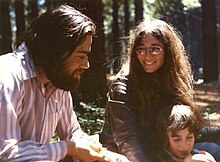Manuel Blum
Manuel Blum | |
|---|---|
 Manuel Blum (left) with his wife Lenore Blum and their son Avrim Blum | |
| Born | April 26, 1938 |
| Alma mater | Massachusetts Institute of Technology |
| Known for | Blum complexity axioms Blum's speedup theorem Blum Blum Shub Blum-Goldwasser cryptosystem |
| Spouse | Lenore Blum |
| Awards | Turing Award (1995) |
| Scientific career | |
| Fields | Computer Science |
| Institutions | University of California, Berkeley Carnegie Mellon University |
| Thesis | A Machine-Independent Theory of the Complexity of Recursive Functions (1964) |
| Doctoral advisor | Marvin Minsky[1] |
| Doctoral students | Leonard Adleman Dana Angluin C. Eric Bach William Evans Peter Gemmell John Gill, III Shafi Goldwasser Mor Harchol-Balter Diane Hernek Nicholas Hopper Russell Impagliazzo Sampath Kannan Silvio Micali Gary Miller Moni Naor Rene Peralta Ronitt Rubinfeld Steven Rudich Troy Shahoumian Jeffrey Shallit Michael Sipser Elizabeth Sweedyk Umesh Vazirani Vijay Vazirani Hal Wasserman Luis von Ahn Ryan Williams Ivan da Costa Marques[1] |
| Website | www |
Manuel Blum (Caracas, 26 April 1938) is a Venezuelan computer scientist who received the Turing Award in 1995 "In recognition of his contributions to the foundations of computational complexity theory and its application to cryptography and program checking".[2][3][4][5][6][7][8]
Education
Blum was educated at MIT, where he received his bachelor's degree and his master's degree in EECS in 1959 and 1961 respectively, and his Ph.D. in mathematics in 1964 supervised by Marvin Minsky.[1][7]
Career
He worked as a professor of computer science at the University of California, Berkeley until 1999. In 2002 he was elected to the United States National Academy of Sciences.
He is currently the Bruce Nelson Professor of Computer Science at Carnegie Mellon University, where his wife, Lenore Blum,[9] and son, Avrim Blum, are also professors of Computer Science.
Research
In the 60s he developed an axiomatic complexity theory which was independent of concrete machine models. The theory is based on Gödel numberings and the Blum axioms. Even though the theory is not based on any machine model it yields concrete results like the compression theorem, the gap theorem, the honesty theorem and the Blum speedup theorem.
Some of his other work includes a protocol for flipping a coin over a telephone, median of medians (a linear time selection algorithm), the Blum Blum Shub pseudorandom number generator, the Blum-Goldwasser cryptosystem, and more recently CAPTCHAs.[10]
Blum is also known as the advisor of many prominent researchers. Among his Ph.D. students are Leonard Adleman, Shafi Goldwasser, Russell Impagliazzo, Silvio Micali, Gary Miller, Moni Naor, Steven Rudich, Michael Sipser, Ronitt Rubinfeld, Umesh Vazirani, Vijay Vazirani, Luis von Ahn, and Ryan Williams.[1]
References
- ^ a b c d Manuel Blum at the Mathematics Genealogy Project.
- ^ ACM Turing Award Citation, retrieved 2010-01-24.
- ^ Manuel Blum at DBLP Bibliography Server
- ^ Manuel Blum publications indexed by Microsoft Academic
- ^ Blum, Manuel; Micali, Silvio (1984). "How to Generate Cryptographically Strong Sequences of Pseudorandom Bits" (PDF). SIAM Journal on Computing. 13 (4): 850. doi:10.1137/0213053.
- ^ Blum, M.; Floyd, R. W.; Pratt, V. R.; Rivest, R. L.; Tarjan, R. E. (August 1973). "Time bounds for selection" (PDF). Journal of Computer and System Sciences. 7 (4): 448–461. doi:10.1016/S0022-0000(73)80033-9.
{{cite journal}}: Invalid|ref=harv(help) - ^ a b Blum, Manuel (1967). "A Machine-Independent Theory of the Complexity of Recursive Functions" (PDF). Journal of the ACM. 14 (2): 322–336. doi:10.1145/321386.321395.
- ^ Blum, L.; Blum, M.; Shub, M. (1986). "A Simple Unpredictable Pseudo-Random Number Generator". SIAM Journal on Computing. 15 (2): 364. doi:10.1137/0215025.
- ^ Blum, L.; Blum, M. (1975). "Toward a mathematical theory of inductive inference". Information and Control. 28 (2): 125. doi:10.1016/S0019-9958(75)90261-2.
- ^ Von Ahn, Luis; Blum, Manuel; Hopper, Nicholas J.; Langford, John (May 2003). "CAPTCHA: Using Hard AI Problems for Security". Proceedings of the International Conference on the Theory and Applications of Cryptographic Techniques (EUROCRYPT 2003).
- 1938 births
- Living people
- Venezuelan emigrants to the United States
- Venezuelan Jews
- Members of the United States National Academy of Sciences
- University of California, Berkeley faculty
- Carnegie Mellon University faculty
- American computer scientists
- Theoretical computer scientists
- Turing Award laureates
- Jewish American scientists
- Massachusetts Institute of Technology alumni
- Members of the United States National Academy of Engineering
- International Association for Cryptologic Research fellows
